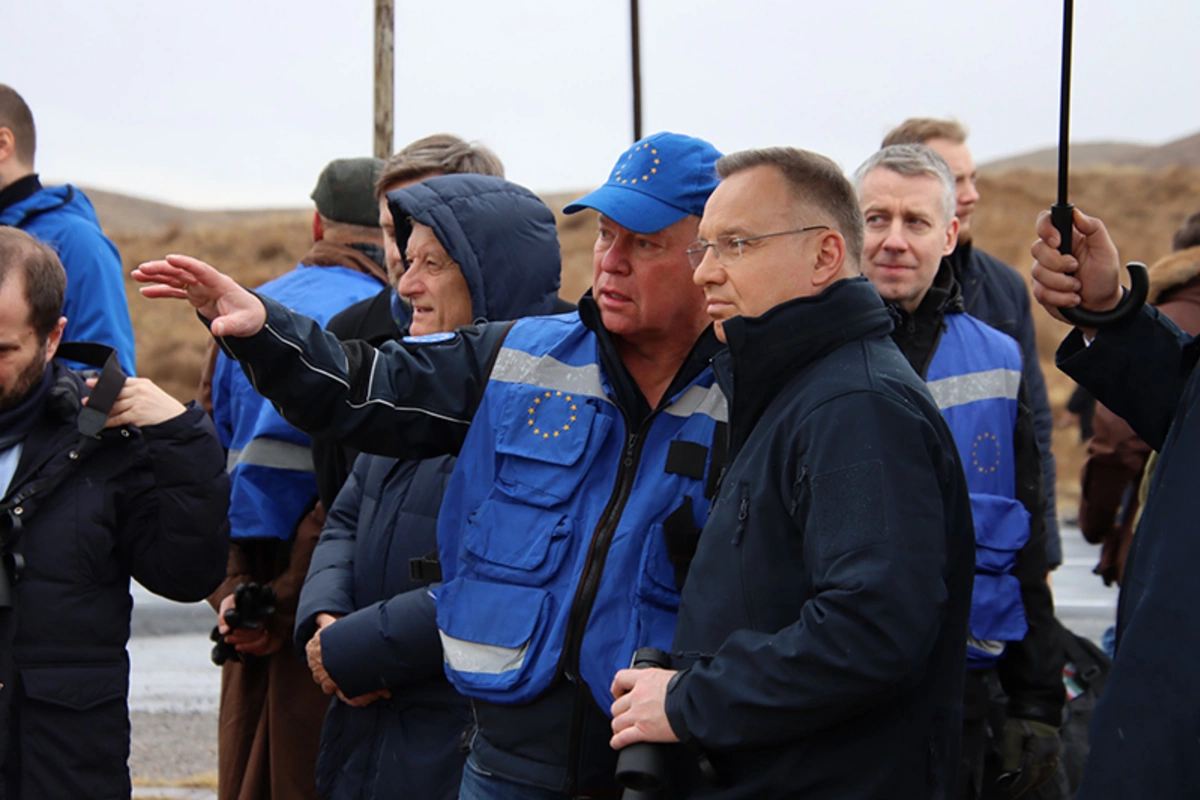
Visiting other countries is President Duda’s prerogative, but visiting a border area with the intent of studying the neighboring country’s territory goes beyond a personal or Warsaw-led initiative.
Google images
By Tural Heybatov
The brief visit of Poland’s President Andrzej Duda to Armenia continues to raise questions. It is difficult to call it an official or working visit. The trip was marked primarily by his visit to the Armenian "genocide memorial" and his observation of the Azerbaijani border through binoculars. The latter, it seems, was the main purpose of his visit, The Caspian Post reports.
The trip bore no connection to the Polish-Armenian agenda. Poland has never been involved in Armenian-Azerbaijani matters, has not been considered a mediator, and has shown no prior initiative in this direction. Thus, it is apparent that the Polish leader traveled to Armenia on behalf of European circles with vested interests in the region but, for various reasons, were unable to address them directly. Following the success of COP29, which Armenia ignored in anticipation of its failure, Yerevan needed to demonstrate evidence of European support. The West needed to affirm its commitment to promises made to Armenia, and Duda's visit served this purpose.
Andrzej Duda observed the Azerbaijani border in the vicinity of the Armenian-occupied village of Karki. As is well known, this is a Nakhchivan village occupied during the First Karabakh War, now inhabited by Armenians and renamed to suit their narrative. However, this does not negate its rightful belonging to Azerbaijan and the necessity of its eventual return to its true owners. It is expected that Baku will soon revisit the issue of enclaves, and Yerevan, with the support of the European monitoring mission and EU allies, is preparing to obstruct the resolution of this matter. There is suspicion that Duda’s visit to this particular border section was tied to these countermeasures. During his visit, the Polish president observed Azerbaijani positions and listened to Armenian narratives, which he later relayed to journalists upon his return. His comments implied that the EU monitoring mission had saved Armenia from aggression by its neighbors. While he refrained from explicitly naming Azerbaijan, it was clear who the European "binocular diplomacy" was targeting.
Visiting other countries is President Duda’s prerogative, but visiting a border area with the intent of studying the neighboring country’s territory goes beyond a personal or Warsaw-led initiative. As a politician and the president of a nation with good relations with Azerbaijan, Duda should have heeded Baku's requests not to take this step. Baku was aware of his plans and warned that such actions would be viewed as unfriendly. Yet, Duda proceeded. For him, maintaining relations with Azerbaijan appeared less important than the EU’s reckless attempts to seize initiative in the region.
No one likely believed that this visit would legitimize European mediation between Baku and Yerevan. Instead, it seemed to be a promotional effort ahead of February, when the mandate of the EU monitoring mission is set to expire. Renewing this mandate lacks unanimous support among EU members, necessitating a narrative about the "treacherous" Azerbaijan, with the mission positioned as the sole buffer protecting Armenia. The EU is keen to emphasize that without the monitors in blue vests, Armenia is doomed. Andrzej Duda was chosen for this mission because of his good relations with Azerbaijan and personal rapport with President Ilham Aliyev, which presumably would soften Baku’s reaction.
Indeed, Azerbaijan’s Foreign Ministry responded with restraint. This is because relations between Baku and Warsaw are genuinely strong, and just days before, the two presidents held friendly discussions on cooperation prospects. In Azerbaijan, such duplicity is puzzling; the country values clear, independent positions and would not undertake actions against Poland's interests.
Double standards, inconsistency, and a lack of logic erode Western policies. From this perspective, one should not be surprised by Duda’s provocative actions in Armenia after amicable talks in Baku. A similar lack of consistency was evident during the leaders’ group photo at COP29 when Duda, for well-known reasons, refused to appear alongside Belarus’ president. The resulting empty spot in the front row likely belonged to the Polish president, a leader staging symbolic protests in Baku while his country harbors territorial ambitions toward Ukraine's western regions. Such contradictions speak volumes.
While Baku’s response was measured, it is clear that Andrzej Duda’s peculiar behavior in Armenia will leave a mark. Perhaps the Polish president did not intend to provoke anyone or see his actions as objectionable, but the outcome speaks for itself. The strategic partnership between Poland and Azerbaijan has suffered its first significant crack.
Share on social media